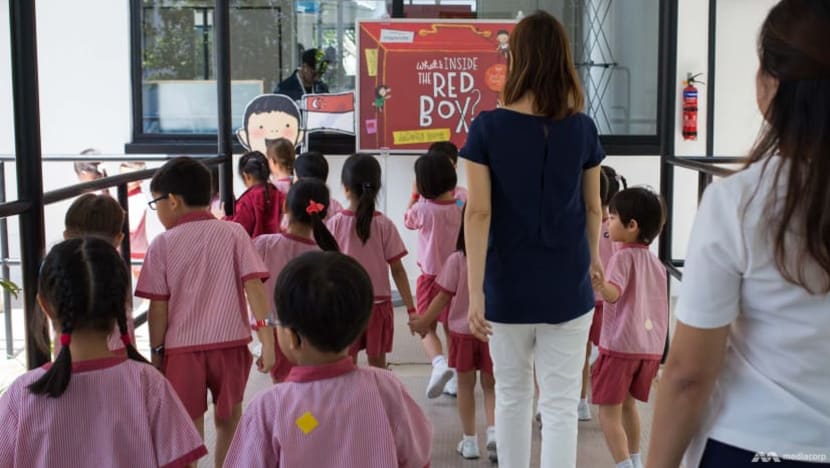Politics
Singapore’s Preschool Voucher Debate: Costs vs. Quality

In a recent parliamentary session, Singapore’s Senior Parliamentary Secretary for Social and Family Development, Eric Chua, cautioned that implementing a preschool voucher scheme could lead to increased fees without enhancing accessibility or quality in the sector. His remarks followed an adjournment motion by Kenneth Tiong, a Member of Parliament from the Workers’ Party (WP), who proposed various reforms aimed at creating a fairer and more diverse preschool education landscape.
During the session on October 14, 2023, Tiong highlighted concerns regarding preschool closures, particularly citing the case of Red SchoolHouse @ Toh Tuck, which reportedly failed to pay its employees before shutting down in May. He emphasized that independent preschool operators face significant financial pressures, particularly when competing against those receiving substantial support from government schemes.
Concerns Over Market Distortion
Tiong criticized the current funding model, which he argued has created a “deeply distorted market.” Direct operator subsidies are primarily accessible to those under the Early Childhood Development Agency (ECDA) schemes, while the Ministry of Education (MOE) kindergartens benefit from national budget allocations. This imbalance, he asserted, has led to declining enrolment and increased competition for talent among independent providers, forcing some to close their doors.
In proposing a voucher system, Tiong aimed to empower parents to select preschools that best cater to their children’s needs, regardless of the institution’s backing. This, he argued, would foster competition based on quality and service, rather than predetermined models. He stated, “This empowers parents to choose a preschool that best fits their child’s needs — be it PCF, Montessori, faith-based organisation, or play-based centres.”
Potential Unintended Consequences
In response, Chua highlighted potential pitfalls associated with a voucher-only approach. He referenced examples from other countries, such as Hong Kong, where a preschool voucher scheme introduced in 2007 was ultimately discontinued due to worsening inequity. Affluent families leveraged vouchers for additional educational programmes, which did not address the needs of lower-income households.
“Having a voucher scheme alone may result in unintended consequences, such as an increase in preschool fees without improvements in accessibility or quality,” said Chua.
Chua also pointed to the UK’s nursery voucher programme, which was implemented in 1996 but quickly abandoned due to similar issues of unfair competition and reduced provider diversity, potentially harming educational outcomes for children.
Singapore, according to Chua, has adopted a more comprehensive strategy regarding preschool affordability. The government aims to keep fees low for supported preschools while offering both universal and means-tested childcare subsidies. Currently, all Singaporean children receive basic subsidies of up to S$300 (US$231) each for full-day childcare, with additional means-tested support available for eligible families.
He concluded that measures like fee caps and subsidies have effectively reduced out-of-pocket expenses for families while ensuring access to quality preschools. He noted, “Full-day childcare expenses before means-tested subsidies will be similar to what households pay for primary school and after-school care fees combined in 2026.”
Chua acknowledged Tiong’s assertion that a voucher system could enhance parental autonomy in preschool choice. However, he argued that similar incentives are already part of the existing subsidy structure, which encourages preschools to improve their offerings based on parental preferences. According to him, parents are becoming increasingly discerning in selecting suitable educational environments for their children.
In recent years, preschool enrolment in Singapore has seen a significant rise, with approximately nine in ten children aged three to six currently attending preschool. This growth indicates a robust demand for early childhood education, even amidst challenges faced by independent operators.
The discussion reflects ongoing tensions in Singapore’s preschool sector, as policymakers weigh the benefits of potential reforms against the risks of unintended consequences, with the goal of ensuring equitable and quality education for all children.
-

 Business5 months ago
Business5 months agoKenvue Dismisses CEO Thibaut Mongon as Strategic Review Advances
-

 Lifestyle4 months ago
Lifestyle4 months agoHumanism Camp Engages 250 Youths in Summer Fest 2025
-

 Sports4 months ago
Sports4 months agoDe Minaur Triumphs at Washington Open After Thrilling Comeback
-

 Sports5 months ago
Sports5 months agoTupou and Daugunu Join First Nations Squad for Lions Clash
-

 Top Stories5 months ago
Top Stories5 months agoColombian Senator Miguel Uribe Shows Signs of Recovery After Attack
-

 World5 months ago
World5 months agoASEAN Gears Up for Historic Joint Meeting of Foreign and Economic Ministers
-

 Health4 months ago
Health4 months agoNew Study Challenges Assumptions About Aging and Inflammation
-

 Business5 months ago
Business5 months agoOil Prices Surge Following New EU Sanctions on Russia
-

 Entertainment4 months ago
Entertainment4 months agoDetaşe-Sabah Violin Ensemble Captivates at Gabala Music Festival
-

 Entertainment4 months ago
Entertainment4 months agoBaku Metro Extends Hours for Justin Timberlake Concert
-

 Top Stories5 months ago
Top Stories5 months agoRethinking Singapore’s F&B Regulations Amid Business Closures
-

 Business5 months ago
Business5 months agoU.S. House Approves Stablecoin Bill, Sends to Trump for Signature









